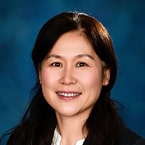AACR-Bristol Myers Squibb Midcareer Female Investigator Grant
The AACR-Bristol Myers Squibb Midcareer Female Investigator Grant represents a joint effort to encourage and support mid-career female physician-scientists and researchers to conduct immuno-oncology research and to foster their career advancement toward becoming a senior investigator. Research projects may be translational or clinical in nature with a focus on immuno-oncology.
2024 Grantee

Research
Distant metastasis is initiated by a small subset of circulating tumor cells (CTCs) with enhanced plasticity to adapt to various environmental stresses during metastatic cascade, including evading immune recognition and elimination. It is unclear how hypoxia induces the molecular behaviors that allow CTCs to maintain an immune-evasive phenotype, even after leaving the hypoxic tumor. Dr. Yu’s group previously showed that hypoxia downregulates tumor intrinsic type I interferon (IFN) and its downstream antigen-presentation (AP) pathways in luminal breast cancer CTCs and cell lines. This effect persists after tumor cells exit the hypoxic environment as a type of “hypoxic memory,” and CTCs with this hypoxic memory showed enhanced tumor growth and metastasis. Dr. Yu proposes to determine the impact of this prolonged suppression of tumor intrinsic IFN/AP signal on the immune landscape and therapeutic responses in the metastatic sites, as well as to delineate the epigenetic regulators that maintain such suppression.
Biography
Dr. Yu received her doctorate from Stony Brook University and Cold Spring Harbor Laboratory, and conducted her postdoctoral training at Massachusetts General Hospital, Harvard Medical School. She is currently an associate professor at the University of Maryland School of Medicine. She leads her laboratory to research on understanding the genetic, epigenetic and microenvironmental regulations of circulating tumor cells that lead to initiation of cancer metastasis in various organs.
Acknowledgment of Support
“I am very honored to receive the 2024 AACR-Bristol Myers Squibb Midcareer Female Investigator Grant. This grant will allow me, at a critical phase of research, to advance our new focus on linking immuno-oncology aspects with breast cancer metastasis.”
2022 Grantee

Research
The sentinel lymph node sits at the crossroads of metastasis and immune surveillance. While lymphatic transport primes lymph nodes for immune activation, it also progressively installs multiple mechanisms of immune suppression that enable tumor progression. In this project, Dr. Lund and her group will dissect the relationship between the primary tumor, lymphatic transport, and the emergence and maintenance of protective lymph node resident memory T cell populations. She will aim to 1) define the anatomic origin and developmental trajectory of sentinel lymph node resident T cell populations, and 2) determine the impact of lymph node metastasis on their maintenance and function. Finally, she will explore their clinical association with recurrence in sentinel lymph nodes of stage III melanoma patients. A basic understanding of sentinel lymph node biology, paired with an evaluation of interpatient heterogeneity, is expected to reveal new determinants of patient outcome that may inform clinical care.
Biography
Dr. Lund received her PhD from Rensselaer Polytechnic Institute in Troy, New York, and completed postdoctoral training at the Ecole Polytechnique Federale de Lausanne, Lausanne, Switzerland. She is currently an Associate Professor in the Ronald O. Perelman Department of Dermatology at NYU Grossman School of Medicine in New York. Dr. Lund and colleagues established the paradigm that tumor-associated lymphatic vessel remodeling regulates anti-tumor immune surveillance. Her group aims to understand the basic mechanisms that govern lymphatic/immune interactions to identify translational strategies to tune lymphatic transport and reinvigorate anti-tumor immunity.
Acknowledgment of Support
The AACR-Bristol Myers Squibb Midcareer Female Investigator Grant will accelerate and expand our efforts to understand how lymphatic transport governs immunity and determines risk for progression in melanoma. I am honored to receive this award and continue to support a diverse team of early career researchers towards their own independence.
2021 grantee

Research
Dr. Schietinger and her colleagues recently demonstrated that although the dysfunctional state of tumor-infiltrating T cells is initially reversible (plastic), these T cells ultimately progress to an imprinted (fixed) state that is resistant to therapeutic reprogramming. These plastic and fixed dysfunctional T cell states are defined by unique chromatin states and transcription factor networks. In this project, she aims to 1) employ CRISPR-mediated editing approaches to identify and target molecular drivers of T cell dysfunction and 2) identify the phenotypic, functional, and epigenetic states of human tumor-infiltrating T cells. In addition, she plans to test whether surface proteins can be used as biomarkers of the underlying epigenetic programs to predict which patients are likely to benefit from immunotherapeutic interventions.
Biography
Dr. Schietinger received her PhD from the University of Chicago and University of Munich, Germany, and conducted her postdoctoral training at the University of Washington. She is currently an associate member of the Immunology Program at Memorial Sloan Kettering Cancer Center. She aims to understand when, why, and how immune cells become unresponsive to tumors. Her lab utilizes genetic cancer mouse models that mimic cancer development in patients to investigate T cell responses over the course of tumor development, and define the molecular and epigenetic mechanisms that are responsible for the failure to control and eliminate tumors.
Acknowledgment of Support
The 2021 AACR-Bristol Myers Squibb Midcareer Female Investigator Grant award will allow us to conduct bold, high-risk high-reward science needed to design transforming immunotherapeutic reprogramming strategies for all cancer patients.